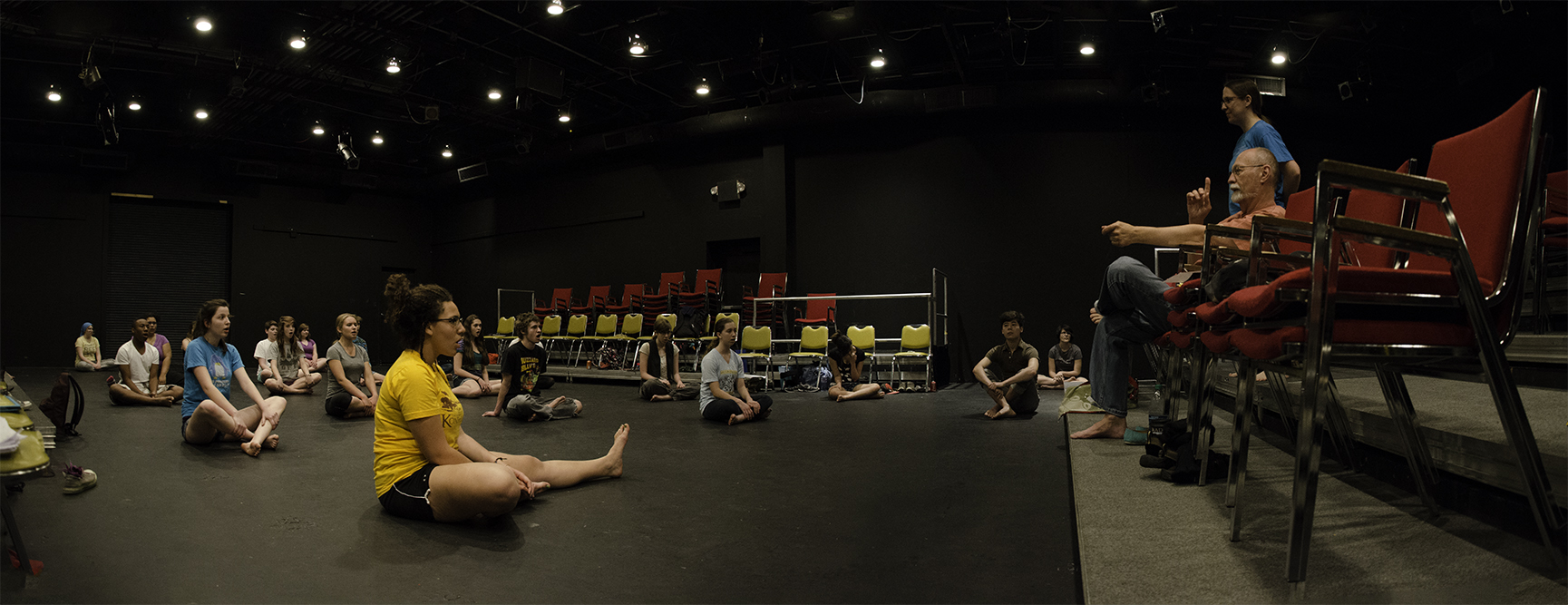We began session 6 with a one note orchestra, something we’ve been doing in the workshop since my days as a participant. In this exercise everyone simply sits still, inhales and makes a tone on the exhale. You start at as low a volume as possible and with each breath you bring the volume up just a little bit. Everyone starts at a different time, so the tones aren’t at the same level, but soon the whole space is full of an orchestra of single tones. Despite the fact that it in no way requires awareness of your fellow performer’s whereabouts, this exercise always seems to feed the groupmind to about twice its previous size, cementing our ensemble. It also seems to wash the entire space we are working in with our presence, making the space where we work truly our own. The work always seems to reach a higher level after this exercise. So simple. So powerful. Then we did Boal’s weight exercise. Cue evil laugh.
[youtube http://www.youtube.com/watch?v=xcv6rdPDAXg&w=560&h=315]
After that we played with some different ways to make natural movements look unnatural. We did this by pretending to be cats waking up and stretching and doing cat things, then by doing things as though we were puppet cats on strings, and finally by pretending to be robot cats. The greatest thing about robot cats is that sometimes they malfunction. Hilarious!
In the readings we began with White Chocolate for My Father by Laurie Carlos. In a 1993 interview Carlos describes her play as “ . . . the culmination of an exploration that I’ve been doing for quite some time. About why it is culturally and in terms of one’s family, certain things happen, or are allowed to continue and how cycles are broken in terms of cruelty, abandonment, low self-esteem, or high self-esteem, economic establishments.” In the play five generations of Carlos’s family appear on stage telling stories of the effects of these cycles in their lives, and singing and dancing to the songs Carlos grew up listening to on the radio and that she imagines they may have heard in their lifetimes. The subject matter is difficult with every generation suffering from racism, violence, and abuse. The play itself seems to be Carlo’s answer to how these cycles can be broken.
Lore: I come here with nothing. My mothers face my grandmothers hips my fathers nose and pudgy hands, his heels.
Mama: Your nose is too wide too big too flat. (She repeats the line four times) You need to teach those girls to play piano. They need to learn to sew. That dancing wont get em nowhere.
This is a moving photograph.
Mickey: I dream of Sweden and Paris in your eyes.
Mama: Looking at your face I see what the race will come to.
Tony: The face moves over to cry in crowds.
Mama: Your face lives like belching on ice cream.
Tiny: This face is Sharon & Walter dreaming.
Mickey: This face is always a photo and music.
Mama: Your face is remembered and ruined.
Mickey: my face is unimagined and forgotten.
-Laure Carlos, White Chocolate for My Father
Our second reading was of Awakening by Chiori Miyagawa. Miyagawa presents the story of Kate Chopin’s novel The Awakening as a journey, not only of discovery of self, but also as a journey towards releasing the idea of self and reaching nirvana. Kate Chopin appears as a character in the play, inhabiting the same space as the characters she created. Miyagawa is always interested in memory and history and in Awakening she collapses the time and space between Kate, her characters, her readers, and the audience. The dialogue is spare and things that are not necessary go unseen and unheard by the audience who is meant to understand that they have passed unseen. The story is constantly interrupted by repetitions of scenes that have come before or have yet to be seen in their entirety, creating the idea that everything is happening constantly and simultaneously. Miyagawa also encourages use of movement to express action and ideas rather than dialogue and uses composed songs at times furthering the effect that everything is taking place in a memory, one that is constantly reworking itself.
Edna: Years have gone by in dreams. Illusions. I might have kept sleeping for a hundred years. How painful it is to wake up to this life. All that I desire will not come true. All that the others demand of me will not be met. There is no place to be alone. There is no beginning, no ending. How strange life is. How very sad and mad and bad it is. How unbearably beautiful it is. Freedom is knowing that none of this stays. It will all pass. As I will.
-Chiori Myagawa, Awakening
After the readings we did some image theater. We used the ideas of love and disillusionment for our images. When we did the final step and put together an image of love with an image of disillusionment and added a moving transition between the two we had some truly funny disillusionments going on, some truly sad ones, and some rather mysterious but powerful ones.
So that’s it, twelve authors in six sessions. Now they all have the difficult task of deciding which of these authors they would like to emulate in their own work of the coming weeks. Difficult decision. I know they will make it well.


Leave a Reply
You must be logged in to post a comment.